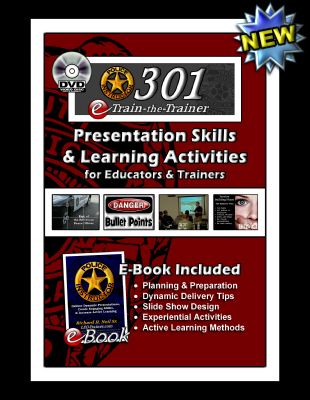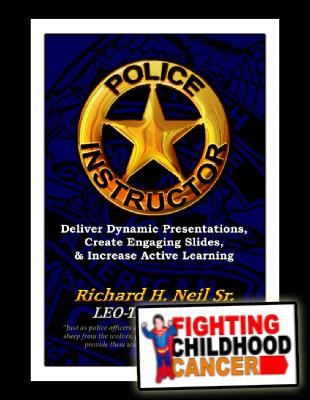There are speakers who say you have less than 5 minutes to make a lasting impression with your audience, and others who only give you 60 seconds. They are both right depending on the audience. With police cadets, you have more time to impress them since they are eager to learn and excited to have the opportunity to be there. Veteran cops on the other hand may not even give you 60 seconds. They may not want to be there in the first place but you can quickly earn their interest, and eventually their trust, if you start out with something powerful. By showing them the benefit of your presentation, you will gain their attention and interest. You can start with a personal story, a unique fact, or a controversial quote. Just about any way to start out with a bang will work.
“An emotionally charged event is the best-processed kind of external stimulus EVER measured.” ~Dr. John Medina, Brain Rules
Using a controversial topic to engage the emotions of your audience is one option. Consider looking for a point of contention relevant to the topic, and exploit it to fuel a debate among your students. Dispute, even anger among them, shows interest in your topic. These emotions are a daily occurrence for law enforcers and they will benefit from this type of learning experience.
I will take debate and anger any day over boredom and sleeping, but some instructors cannot handle the thought, or feeling, of losing control. They would rather lecture without involving their students and maintain complete dominion over the class. There can be little gained by anyone in this type of learning environment.
“Emotionally charged events persist much longer in our memories and are recalled with greater accuracy than neutral memories.” ~Brain Rules
Consider any well-known book, article, news story, or quote as a unique way to start your next class. I purposely use controversial statements that I know will make a class of cops or cadets mad, sad, or happy. If they are mad, they are listening. They want to know why I used it and what comes next. Do not be afraid to challenge their core beliefs or yours – they will come out stronger and be more attentive knowing that nothing is off limits in your presentation.
I usually place short statements on the screen for students to ponder and then follow up with the remainder of the information. Here are a few examples of materials I have used before.
True or False: As many as one third of law enforcers in this country are impaired by PTSD (Post Traumatic Stress Disorder) and cannot function well, if at all. ~from the book CopShock by Allen R. Kates
The statement is true and backed up by several different studies. Here are a few follow up statistics to drive the point home for your audience of veterans or cadets.
- Rates of PTSD among American police officers are as high as 35% (Mann & Neece, 1990).
- Law enforcement personnel have been reported to have three times the rate of suicide, increased alcohol use and cardiovascular diseases, and twice the rate of divorce compared to the general population (Marmar et al., 2007; McCaslin et al., 2007).
- 69% of law enforcement officers who retired early left for psychological reasons (Miller, 1996).
Rookie Stress
True or False: Over 50% of rookie officers will encounter a critical incident in their first year?
- It’s false. It is much higher with 94.5% of police recruits reporting exposure to at least one critical incident during their first year of police service (Marmar et al., 2007).
We Need Warriors
Ask your cadets the following question. “Can we survive without doctors and hospitals?”
I always get a quick answer back from my class, “Of course not.” They answer without thinking about our ancestors who survived for the past 10,000 years without medical sciences (but with 4 spinal implants I’m happy we have them now). After allowing the class time to debate the topic, place the following statement from On Combat (Lt. Colonel Dave Grossman and Loren W. Christensen) on the screen, and ask the students if the statement is true.
- We could go for a generation without the doctors… but civilization would continue. If, however, we went but a single generation without the warriors who are willing to confront human aggression every day, then within the span of that generation we would truly be “both damned and doomed.”
It will start a great discussion and help our future guardians see the importance of warriors in our culture.
Crapping Your Pants
Is it natural to wet your pants when you are in a life and death situation? Should we let officers know what physical and biological changes they may encounter in such circumstances?
- Research shows that if you have a “load” in your lower intestines during a highly stressful survival situation, it’s going to go. Your body says, “Bladder Control? I don’t think so. Sphincter control? We don’t need no stinking sphincter control!” What do you do if that happens? You keep on fighting. ~On Combat, Lt. Col. Dave Grossman
Tunnel Vision
Out of 10 officer involved shootings, how many police officers would suffer from tunnel vision?
- Eight out of 10 suffered tunnel vision. ~ Alexis Artwohl, Ph.D. is an internationally recognized behavioral science consultant to law enforcement, and she is an advisory board member for the Force Science Research Institute.
Killing Ain’t Easy
In WWII only 15% to 20% of trained riflemen fired their weapons at exposed enemies when alone. If a leader ordered them to fire, nearly all did, but you won’t have anyone commanding you. ~Study by General S.L.A. Marshal
- These figures have dramatically increased with realistic targets and training.
- As a cop or a peacekeeper, your job is not to kill, it is to serve and protect. To do that, you may have to kill. ~On Combat, Lt. Col. Grossman
- This is the great paradox of combat: If you are truly prepared to kill someone, you are less likely to have to do it. ~On Combat, Lt. Col. Grossman
These types of discussions will create a variety of emotions and also create understanding that will be retained by your audience. People learn best when there is an emotional connection. We are not swayed by logic as many instructors think.
If people were swayed by logic and not emotion…
- No one would smoke.
- No one would have unprotected sex with a stranger.
- And no one would spit on a cop and expect him to say thank you.
We are emotional beings, and emotion rules our lives and our learning.
Some instructors shoot themselves in the foot from the very beginning (no pun intended for the agent who did). They start out weak with a monotone, boring, and irrelevant opening that highlights their personal exploits and lengthy bio. An audience will never be swayed or pulled in to our presentation by any attempts to show them how great we are. They have no emotional connection to us or our repertoire.
Start with something memorable, and choose a strong theme to draw your audience in right from the beginning. People will remember the beginning of your presentation if you make it emotional and powerful.
Richard Neil is the author of “Police Instructor: Deliver Dynamic Presentations, Create Engaging Slides, & Increase Active Learning.” He is a retired city cop, and instructs for several of Ohio’s criminal justice training academies. He can be contacted through his website that is dedicated to law enforcement training resources – http://www.LEO-Trainer.com.













